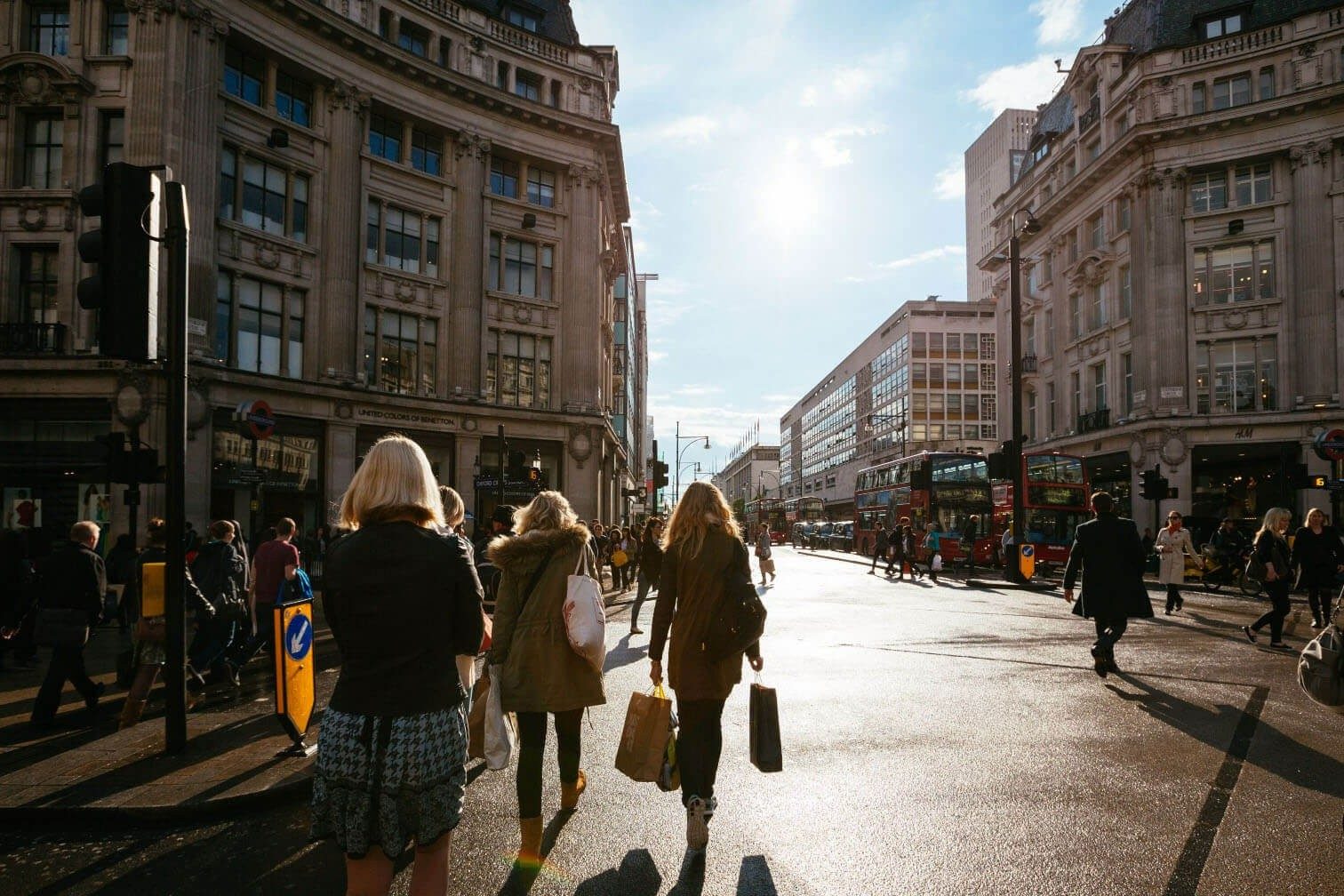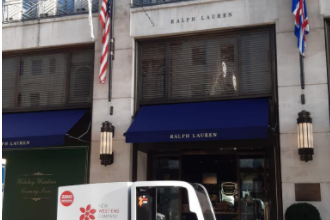Retail in London’s West End has a responsibility to lead the way to more sustainable shopping. Home to global flagships, innovative new brands and up and coming concepts, what happens here will be a building block for retail destinations across the globe.
Here we will showcase West End business strategies and initiatives at the forefront of sustainability and innovation across retail.
The Challenge
Selfridges’ wider sustainability strategy is to have 45% of transactions from circular products and services by 2030 and to reach net-zero emissions by 2050. The fashion industry is estimated to be responsible for 10% of global carbon emissions.
Selfridges approach
Selfridges launched ‘RESELFRIDGES’ in 2020. This initiative, available in-store and online, allows Selfridges customers to buy second-hand items to reduce their impact as well as supporting repair and rental in the London area. Selfridges London is now a circular hub with a SOJO repair, HURR rental, and vintage retailers Vintage Threads and We Are Cow in one location. This year, RESELFRIDGES has expanded this circular initiative to all Selfridges stores across the UK.
-READ LESS
The Challenge
E-waste is one of the fastest-growing types of domestic waste and is estimated to have a potential value of $57 billion. In terms of carbon emissions, digital technologies are responsible for just under 6% of global emissions, 31% of this is contributed by mobile phones computers, laptops, display systems etc. With over 20% of the global mobile phone market, Apple has a significant impact on the entire industry.
Apple’s approach
Apple published its 2024 environmental progress report in April which shares its journey to be carbon neutral by 2030 and net zero emissions by 2050. The report boasts a 55% decrease in carbon emissions across all scopes compared to a 2015 baseline and did not include offsets. This achievement places Apple closer to its 2030 carbon-neutral goal which involves a 75% reduction in carbon emissions. The other report highlights include the release of a laptop made from 50% recycled content, and working with 320 suppliers (equivalent to 95% of supplier spend) to see their suppliers commit to using renewable energy.
Apple will also update its repair methods to use pre-owned parts of Apple devices in an effort to increase product longevity and reduce the environmental impact of repair.
-READ LESS
-READ LESS
-READ LESS
-READ LESS
-READ LESS
-READ LESS
The challenge
Mattresses are extremely difficult to recycle as they are made up of around 19 different materials. In 2020, around 6.4 million mattresses were disposed of in the UK, with the majority ending up in landfill.
IKEA’s approach
IKEA UK has introduced a new mattress removal and recycling programme in partnership with The Furniture Recycling (TFR) Group. Customers can arrange a collection from TFR Group using a discount code from IKEA, and the mattress will be deconstructed, enabling the component parts to be recycled and diverted from landfill. IKEA also plans to use TFR Group’s mattress rejuvenation service, which sanitises and repairs mattresses so they can be resold or redistributed to communities.
The scheme joins other circular initiatives from IKEA, such as its BuyBack & Resell service which encourages customers to return pre-loved furniture in return for store credit.
-READ LESS
-READ LESS
-READ LESS
The Challenge
Beauty brand L’Occitane Group has been committed to improving its environmental and social performance for many years but sought a structured way to measure the impact of its decisions on all stakeholders, including employees, supply chain, customers and the planet. L’Occitane also wanted a framework against which to continuously improve its ethical practices.
L’Occitane’s approach
L’Occitane has become a certified B Corp, having met rigorous standards of social and environmental performance, accountability, and transparency. The certification process took two years and included a B Impact Assessment, which is verified by B Corp and requires businesses to score at least 80 points (L’Occitane scored 85.4).
A primary focus for L’Occitane is to create more sustainable agricultural systems by actively engaging with farmers and suppliers in its value chain, as well as participating in sector initiatives to influence policy and system level change. This will feed into the Group’s broader target of reducing scope 3 emissions by 55% per value-added unit by 2030.
Certified B Corps must undertake the verification process every three years to maintain their status, encouraging businesses to strive for continuous improvement. L’Occitane joins over 1,100 other B Corps in the UK.
-READ LESS
The Challenge
Although more than 70% of Marks & Spencer’s customers bring their own bags to store, the retailer still needs to provide options for bags on the go. Many retailers have promoted ‘bags for life’ – typically made of a thicker, more robust plastic designed to carry heavier loads and withstand multiple uses. However, this still relies on the promotion of plastics, which can be difficult to recycle and can often end up as environmental pollution. Additionally, many of customers already have multiple bags for life at home, leading to unnecessary plastic consumption. However, plastic has been relied upon because of its durability.
Marks and Spencer’s approach
Marks & Spencer has developed a paper equivalent of the bag for life which is capable of carrying over 15KG and can withstand up to 100 uses. A natural resin gives the bags a water-resistant treatment, and the design can be easily folded. The bags are made from FSC approved paper, are produced in factories powered by renewable energy, and will be easier for customers to recycle at home at the end of life. However, the transition means that Marks & Spencer is investigating alternative uses for soft in-store plastics previously used to create its plastic bags for life.
-READ LESS
A new recycling scheme launched by fashion companies including Adidas and Inditex aims to collect post-consumer trainers and shoes to ensure they are recycled into new products. The scheme will take collections from all across the value chain and separate shoes into different components. Once divided, parts are ground down into small granulates which can be reformed into new materials. Read more.
-READ LESS
-READ LESS
Marks and Spencer have partnered with eBay and Oxfam to extend their ‘schwopping’ scheme – where customers donate old clothes to charity in exchange for vouchers – for school uniforms. The move is designed to support families in preparing for the new school year amidst the cost-of-living crisis. Click here to read more.
-READ LESS
-READ LESS
-READ LESS
-READ LESS
Product materials are the foundation of Stella McCartney’s sustainability initiatives, combining nature with cutting-edge innovation to create the luxury fashion with minimal impact. From using only recycled cashmere, no leather, fur or skins in production to sourcing fibres in a way to protect our forests, Stella McCartney strives to deliver luxury without a cost to the environment. Click to read more.
Stella McCartney announces most sustainable line yet – The latest launch from Stella McCartney announced that 91% of materials are responsibly sourced, shunning leather, feathers, fur and exotic skins in favour of recycled, organic, regenerative and lower-impact fabrics. Read more.
-READ LESS
Gucci Italy has announced an open innovation platform looking to improve the circularity of its products across the whole life cycle. The hub will look at material use, durability, repairability and end of life potential, as well as optimising production and logistics to distribute goods. Supply chain engagement is a core part of the initiative, which involves over 4,000 business in total. Gucci Italy’s parent company Kering Group have plans to scale these activities across other brands. Click to read more.
-READ LESS
H&M’s latest initiative – Bottle2Fashion – celebrates international collaboration and turns plastic waste into everyday fashion. Giving a second life to plastic bottle waste, bottle2fashion is a collaborative project for production that is better for our planet. Not only does it support the Indonesian government’s initiative against marine pollution, but it also enables us to lower the footprint of our garments by using recycled materials. Click to read more.
H&M explore textile sorting – H&M group have made significant investments into textile sorting in the creation of joint venture with recycling company Remondis, which aims to extend the life of 40m garments a year. Read more.
-READ LESS
Lush’s Bring It Back recycling scheme allows customers to return any of their Lush plastic packaging back to its shops for recycling. As well as offering the recycling service, Lush incentivises customers to bring their packaging back by offering a discount off purchases. Since launching the scheme in 2020, LUSH Oxford Street has stopped 24’872 pieces of plastic going back into the environment. Click to read more.
-READ LESS
The below highlights industry trade body resources and commitments that may apply to your West End business. Read on to find out more about these initiatives and how to get involved.

British Retail Consortium Climate Action Roadmap
The British Retail Consortium (BRC) is the trade association for retail businesses, with representation across the UK’s major brands in fashion, home and DIY, mixed retail, stationery and craft, food and drink, fast food, electronics, sport and other specialists.
The BRC produced a Climate Action Roadmap for the retail sector, committing to a science-led strategy to limit global warming to 1.5C.
AmbitionsSupporters of this Roadmap have committed to collectively bring the UK retail industry’s greenhouse gas emissions to net zero by 2040.
Supporting this headline objective of net zero by 2040 are 3 key milestones, some in advance of 2040:
- 2030 – net zero for Scope 2 – (retailers’ electricity use)
- 2035 – net zero for Scope 1- (retailers’ fuel, gas and refrigerant use)
- 2040 – net zero for all products sold in the UK across all Scopes
Actions
The Roadmap describes how the retail industry can decarbonise, while continuing to deliver an outstanding retail experience, through action in five areas:
- Putting greenhouse gas data at the core of business decision making;
- Operating efficient sites powered by renewable energy;
- Moving to low carbon logistics;
- Sourcing sustainably; and
- Helping our employees and customers to live low carbon lifestyles.
Details and support can be found on the BRC Climate Action Roadmap website
WRAP – The UK Plastics Pact 2025
Chaired by the Waste and Resources Action Plan (WRAP), the UK Plastics Pact is a voluntary commitment to reduce plastic production and waste by 2025 via committing to four targets:
- Eliminating problematic or unnecessary single-use packaging through redesign, innovation or alternative (reuse) delivery models
- 100% of plastics packaging to be reusable, recyclable or compostable by 2025
- 70% of plastics packaging effectively recycled or composted by 2025
- 30% average recycled content across all plastic packaging by 2025.
Signatories include Tesco, McDonalds and Next.To achieve The UK Plastics Pact targets it is imperative we address some critical issues and find solutions working in collaboration with the plastics value chain. These include:
- Flexible plastic packaging: Flexible plastic represents a quarter of all UK consumer plastic packaging, but only 6% is currently recycled. Urgent action is needed.
- Problem plastics: Eliminating problematic plastics and rethinking and redesigning our plastics so they are more easily recycled.
- Designing for recyclability: Use our polymer choice and recyclability guidance to design packaging fit for the future
- Citizen behaviour change: Hard hitting campaigns, world leading citizen research and insight are transforming recycling behaviours in the UK.
SBTi Net Zero Standard
Science-based targets provide a clearly-defined pathway for companies to reduce greenhouse gas (GHG) emissions, helping prevent the worst impacts of climate change and future-proof business growth.
Targets are considered ‘science-based’ if they are in line with what the latest climate science deems necessary to meet the goals of the Paris Agreement – limiting global warming to well-below 2°C above pre-industrial levels and pursuing efforts to limit warming to 1.5°C.In order to be recognised as a ‘net-zero business’ acting in line with climate science, businesses must now at least halve their emissions by 2030, and reduce them by 90% by 2050 at the latest, all without the use of carbon offsetting. Companies with land-intensive operations must also set an SBTi Forestry, Land Use and Agriculture (FLAG) Target.
In June 2023 SBTi released a new guidance document to support businesses in addressing supply chain emissions, outlining how larger companies can encourage their suppliers to set their own science-based targets. The guidance includes how to identify and prioritise suppliers for reduction targets, securing buy-in, training and engagement tools and methods, and monitoring progress.
SME Carbon Calculator
A free calculator is available for SMEs through the UN-backed SME Climate Hub. This tool is as significant advancement on most free calculation tools as it takes into account Scope 3 value chain emissions.
GHG Protocol Land Sector and Removals Guidance
In 2023, the Greenhouse Gas Protocol (the standard methodology for corporate measurement of emissions) will be launching new guidance on how to measure emissions and removals from land use, land use change, biogenic products, technological CO2 removals, and related activities. It is expected that this guidance will support the reporting in the TNFD framework. Companies with significant land use emissions, or who invest in carbon removals and storage, should take note of developments. Draft guidance for pilot testing was published in September 2022.
Science Based Targets for Nature (SBTN)
Science Based Targets for Nature is a sister organisation to the Science Based Targets initiative (SBTi). They provide guidance on setting environmental targets aligned with the best practice recommendations from the scientific community to tackle the interconnected challenges of nature depletion and climate change.
Guidance is already available for target setting on climate and emissions reduction through SBTi and the Net Zero Corporate Standard.In May 2023 SBTN announced the first science-based targets for nature in the form of technical guidance for freshwater and land. These cover the ‘Assess, Prioritise and Set” stages of the process, with updates for the “Act and Track” stages to arrive in 2024.
Targets are in development for Oceans and Biodiversity.
The Core Carbon Principles – ICVCM
The Integrity Council for the Voluntary Carbon Market (ICVCM) have developed a framework and quality standards for the carbon offset market, known as The Core Carbon Principles (CCPs). It is hoped that the introduction of the standards will improve the quality and transparency of carbon offsets.
United Nations Environment Programme (UNEP) Sustainable Fashion Communication Playbook
The UN Sustainable Fashion Communication Playbook provides principles and guidance on how to unite customer-facing communications with sustainability targets in the fashion industry. It demonstrates the role of fashion communicators in advancing the aims of the Paris Agreement and sustainable development goals.
Deforestation-Free Call to Action for Leather
Major fashion brands including Kering, H&M, Marks & Spencer, Adidas and Mango have signed up to a new commitment for the sector to end sourcing of cow leather linked to deforestation by 2030. The pledge has been coordinated by the non-profits Textile Exchange and the Leather Working Group. Signatories are required to set sourcing requirements, establish and achieve supply chain targets, invest in industry transformation, implement traceability systems, and report progress annually.
CISL and The Fashion Pact launch fashion, textile and apparel sector primer on science-based targets for nature
The Fashion Pact and Conservation International, with input from Textile Exchange and the Science Based Targets Network (SBTN) have collaborated to develop a sector-specific primer on setting Science Based Targets For Nature. This includes an overview of the concept, an illustrative case study, and immediate actions to address nature loss.
B Corp
B Corporations (B Corps) are companies certified to demonstrate high standards of social and environmental performance, accountability and transparency. Companies of all sectors and sizes can achieve B Corp status. To qualify, companies must achieve 80 out of a possible 200 points across 5 sections: governance, workers, communities, environment and customer engagement. In acknowledgement of evolving best practice in sustainability, B Corp are introducing a new, more ambitious framework of standards across 2024, which will expand from 5 to 10 sections for scoring.
UK Business Climate Hub
The UK Business Climate Hub is a new online resource designed to support businesses to cut energy costs and carbon. Launched by the Government and various UK business groups, the Hub is particularly aimed at SMEs and sets out a framework of seven steps to sustainability.
The Hub includes advice articles on practical actions businesses can take towards sustainability, such as adopting renewable energy, electrifying vehicles and minimising waste. There is also a list of available finance and support, and an events listing page for relevant webinars and in-person events.
Zero Emission Maritime Buyers Alliance (ZEMBA)
Several organisations with a maritime supply chain such as IKEA, Patagonia and Amazon have formed the The Zero Emission Maritime Buyers Alliance (ZEMBA) to accelerate the deployment of zero emissions fuels in the sector. The organisations have launched requests for proposals for zero-emissions shipping services to be delivered in 2025 with the promise of significant bulk purchases if companies can meet their criteria for zero-emissions fuels.
Circular Change Council
eBay UK will convene a new circular economy council intended to boost reuse in the furniture and homeware industry. The Circular Change Council will bring together major retailers including IKEA, Dunelm, Sainsbury’s and the British Heart Foundation. The aim of the initiative is to identify the most common perceived barriers to scaling the sale of used home goods, and develop solutions.
Nature strategy handbook
The Nature Strategy Handbook serves as a practical tool for businesses aiming to create a comprehensive nature strategy. It outlines the essential elements of a credible nature strategy, aligning with various frameworks, guidance, and regulations. The handbook offers a series of essential questions, recommendations, and resources to aid in developing a nature strategy, whether as a separate document or integrated within existing business, climate, or sustainability strategies.
The handbook has been produced by ‘It’s Now for Nature’, a global campaign to bring together the business community to act on nature and contribute towards a nature-positive world by 2030.
British Retail Consortium launches a ‘Manifesto for Retail’
The British Retail Consortium (BRC) has created a vison of an enriched retail future, which embraces the net zero transition and supports the customer. BRC has landed on three major resolutions that are needed for a more sustainable future for the industry.
Firstly, a coordinated approach to tax and regulation is needed as businesses are facing increased costs due to national living wage and rates increases. Secondly, more support for jobs is needed. With the increased digital skills needed in retail, the BRC calls for a reform of the Apprenticeship Levy to cover the costs of courses and training. And lastly, net zero and the circular economy: the BRC points out that recycling rates are stagnant at 44% and asks for regulation to support better waste management.
Edie Sustainability Communications and Disclosure Handbook
Edie has recently released an updated version of their sustainability communications and disclosure handbook. The purpose of this handbook is to help businesses with their sustainability reporting, both voluntary and mandatory. The main focus of the handbook is on greenwashing, disclosures, and storytelling. By combining sustainability reporting, marketing, and communications, the handbook aims to increase transparency and promote positive behaviour change.
UK Government offers £190 to help companies reduce their energy usage
Companies in manufacturing, recycling, controlled environment horticulture, industrial laundries and textile renting services can now apply funding from a £185 million pot through the Industrial Energy Transformation Fund. Applications are open until 19 April 2024 and offers funding for energy efficiency projects, deep decarbonisation projects, engineering studies, and feasibility studies. Depending on the project type and company size, the minimum funding threshold per project is £30,000 – £30 million. Application guidance can be found here. In addition, £6 million has been granted to 12 winners of the Local Industrial Decarbonisation Plan competition, who have used the funding to develop low-carbon development plans.
SBTi reports on beyond value chain mitigation
The Science Based Targets initiative (SBTi) has released two reports to mobilise action from corporations and support the design and implementation of beyond value chain mitigation (BVCM). BVCM is one of the four pillars of the SBTi’s Corporate Net-Zero Standard. It does not reduce a company’s scope 1, 2 or 3 emissions but enables other economic and social actors to avoid, reduce or remove greenhouse gas (GHG) emissions – and is therefore crucial for accelerating global carbon reductions.
The two reports are: Above and Beyond: An SBTi report on the design and implementation of BVCM and Raising the Bar: An SBTi report on accelerating corporate adoption of BVCM.
ISO standard for sustainable events
ISO 20121 was developed in partnership with the Organising Committee of the London 2012 Olympic Games. This standard covers event sustainability management systems and is designed for event organisers who want to integrate sustainability into all aspects of their events. Since the London 2012 Olympics, every Olympic Games has been required to meet the ISO 20121 standard. In preparation for the Paris 2024 Olympic Games, the ISO 20121 has been updated and re-released with a greater emphasis on social issues, inclusivity, diversity, and compliance.
British Retail Consortium’s Guide to Nature and Biodiversity
The British Retail Consortium (BRC) has released a guide for retailers to navigate and coordinate an approach to using nature-related policies and begin working on a nature strategy, as having a strong stance on nature is closely linked with reaching net zero. The guide called ‘Introducing Nature & Biodiversity: A Retailer’s Guide to Nature and Biodiversity for Business’ focuses on Biodiversity Net Gain, TNFD (Taskforce on Nature-Related Financial Disclosures), SBTN (Science-Based Targets for Nature), and the future nature and biodiversity landscape for retailers.
Oxford updates their principles for Net Zero aligned carbon offsetting
Oxford University researchers have updated their guidance on credible and net zero-aligned carbon offsetting. The guidance has been used by hundreds of companies since they were originally published in 2020. The guidance is based on four principles:
- Cut emissions as a priority, ensure the environmental integrity of credits, and regularly revise as best practice evolves
- Transition to carbon removal offsetting for any residual emissions (away from emissions avoidance or reduction) by the global net zero target date
- Shift to removals with durable storage and low risk of reversal
- Support the development of innovative and integrated approaches to achieving net zero
The most significant updates of the guidance include:
- Reinforcing the urgency of reducing emissions
- Re-emphasising the need to close the carbon removal gap as there are not enough high-quality carbon credits to meet future demand
- Highlighting the further recent evidence showing that nature based solutions are critical for addressing the drivers and impacts of climate change
- Clarifying the durability risks and co-benefits of different types of removal and storage
Future Fit Food and Agriculture: report series on global food services investment needed to keep within 1.5C warming
The Food and Land Use Coalition has released a series of reports called ‘Future Fit Food and Agriculture’ which analyses the food and agriculture sector and the roles they play in climate change mitigation. The key finding of the report was that an annual investment of US $205 billion from 2025-2030 (which is about 2% of the sector’s revenues) could mitigate nearly half the global food systems emissions.
The two reports are: Above and Beyond:
- Future Fit Food and Agriculture: Developments in voluntary frameworks and standards and their influence on legislation for business
- Future Fit Food and Agriculture: The financial implications of mitigating agriculture and land use change emission for businesses
The Transition Plan Taskforce resources on mobilising finance for a net zero transition
This guidance from the Transition Plan Taskforce includes sector-specific transition guidance for asset owners and managers, banks, electric utilities and power generators, and summary guidance for 30 sectors in the global economy.
This builds on other resources including international standards, the disclosure landscape, and the transition planning cycle. Advisory papers from TPT working groups on adaptation, nature and SMES have also been published. Transition planning case studies of companies such as Barclays, Scottish and Southern, and NatWest are also available.
Too Good To Go, British Retail Consortium, Sainsbury’s, Tesco, Aldi, and 30 Others Advocate for Mandatory Food Waste Reporting
Surplus food provider Too Good To Go, the British Retail Consortium, and over 30 food retailers and providers have published an open letter to the Secretary of State, urging the implementation of mandatory food waste reporting. Food waste currently contributes to 10% of global emissions and costs the UK £21.8 billion annually. The letter argues that the negative consequences of not publicly reporting food waste outweigh the costs of implementing such a policy.
The signatories acknowledge the efforts of the Waste and Resources Action Programme (WRAP) and the Government in the Courtauld Commitment but stress the necessity of mandatory food waste reporting. They highlight that this would lead to greater investment, economic growth, and improved supply chain efficiency.
The below outlines current and upcoming legislation that may apply to your West End business. This list will be updated throughout the year as legislation changes.
Current legislation
Ecodesign for Energy-Related Products and Energy Information Regulations 2021
Requires manufactures of energy-related products to make spare parts for products available to customers, to extend the lifespan of goods. Read more.
Green Claims code
The Green Claims Code was designed for businesses in 2021 to verify that their environmental claims would not be misleading. Overseen by the Competition and Markets Authority (CMA), the Green Claims Code is based on 6 principles where claims must be truthful and accurate, clear and unambiguous, must not hide relevant information, must consider the full life cycle, must be substantiated, and comparisons must be fair and meaningful. The CMA can take businesses to court where it believes a misleading claim has been made.
Following an investigation by the CMA, ASOS, Boohoo, and George at Asda, an open letter has been published to all fashion retailers, asking them to review their environmental claims. ASOS, Boohoo and George at Asda have also signed formal agreements to ensure their environmental claims are accurate and are not misleading. The retailer’s ‘green’ ranges, statements such as ‘sustainable’ and natural imagery are among the labelling the retailers have agreed not to use going forward. Read more.
Plastic packaging tax
A tax of £200/tonne applies to plastic packaging manufactured in, or imported into the UK, that does not contain at least 30% recycled plastic. Read more.
In April 2023, the government announced a consultation into moving the plastic packaging tax to a ‘mass balance’ approach to better accommodate chemical recycling.
Mandatory Taskforce on Climate-related Financial Disclosures (TCFD) reporting for large businesses
Listed companies, banks or insurers with more than 500 employees will be required to disclose climate-related financial risks in line with the existing TCFD standards. Read more.
Glitter ban comes into effect in EU
A new law banning the sale of microplastics has come into effect in the European Union (EU). The ban applies to any plastics smaller than 5mm in size that do not break down naturally. The personal care and cosmetics industries are likely to be most affected, as the ban includes glitter – although biodegradable glitter is exempt. The ban is part of a broader effort in the EU to address plastic pollution and its impact on ecosystems. Whilst the UK is not affected, any retailer selling in the EU must comply. Old stocks containing glitter may be sold until depleted. Read more.
Upcoming legislation
Voluntary disclosures
Related Items






























